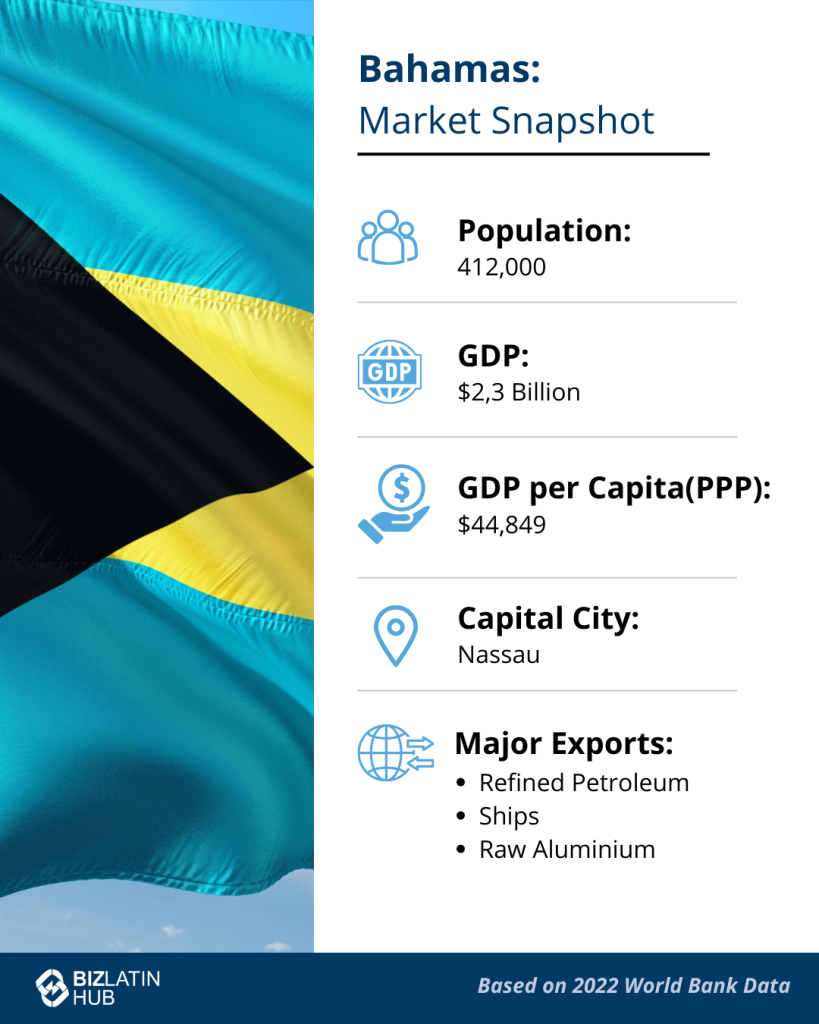An EOR manages employment responsibilities while allowing businesses to focus on growth. This solution is especially relevant in the Bahamas, where navigating local employment laws can be challenging.
This article explores EOR solutions in the Bahamas, including their operation and legal framework. We will discuss key considerations for employing workers, advantages of EORs, and differences from Professional Employer Organizations (PEOs).
What is an Employer of Record (EOR)?
An Employer of Record (EOR) is a service that manages employment-related tasks for client companies. These tasks include payroll, taxes, benefits, and compliance with labor laws. This allows the client to focus on daily operations without worrying about administrative responsibilities.
In the Bahamas, an EOR is beneficial for businesses. It simplifies hiring by removing the need to set up a local subsidiary. This is particularly helpful for international companies facing the Bahamian legal and regulatory environment.

Here is a list of EOR benefits:
- Compliance: Ensures adherence to local labor laws.
- Efficiency: Handles payroll and tax processing.
- Flexibility: Easy workforce expansion without local presence.
- Focus: Businesses concentrate on core activities.
EOR vs. Employer:
| Aspect | EOR | Client |
|---|---|---|
| Administrative Tasks | Managed by EOR | Not involved |
| Daily Operations | Not managed by EOR | Controlled by client |
Using an EOR in the Bahamas helps businesses stay compliant while keeping operational control. It’s a strategic choice for companies expanding internationally.
How EORs operate in the Bahamas
Employer of Record (EOR) services in the Bahamas offer a solution for foreign businesses. They help businesses hire Bahamian employees without establishing a local entity. EORs assume the role of the legal employer for these workers. They manage payroll, taxes, benefits, and HR responsibilities. EORs understand Bahamian employment laws and ensure compliance with contracts, working hours, leave policies, and termination procedures. They handle tax obligations, including social security and national insurance contributions. While EOR services simplify the hiring process, they may add costs and fees.
Legal framework governing EOR services
An Employer of Record is a legal business entity. It employs on behalf of clients in compliance with local laws. This enables businesses to operate without setting up a subsidiary in the Bahamas. EOR services manage payroll processing, ensuring accurate salary calculation, tax deductions, and timely payments in Bahamian dollars. They tackle tax matters, including income tax withholding and National Insurance contributions, and ensure proper reporting to Bahamian authorities. They also administer employee benefits required by Bahamian law. These benefits may include health insurance and pension plans. When hiring foreign workers, EORs help obtain work permits and visas, ensuring compliance with immigration laws.
Role of an EOR in employment management
An Employer of Record in the Bahamas acts as the legal employer for the workforce. They manage tasks like payroll, tax compliance, and benefits. This service allows foreign companies to hire employees without setting up a local entity. The EOR ensures compliance with Bahamian labor laws, tax codes, and employment standards. They provide expert guidance to businesses. By using an EOR, companies can focus on their core business activities. The EOR handles administrative HR tasks and legal obligations related to employment. For foreign workers in the Bahamas, a work permit is necessary, and the EOR manages this requirement.
| Aspect | EOR Responsibilities |
|---|---|
| Legal Employer Role | Assumes legal employer status |
| Payroll Management | Manages salary, deductions, payments |
| Tax Compliance | Handles tax withholding, contributions |
| HR Responsibilities | Manages benefits, leave, termination |
| Work Permits | Assists in obtaining permits, visas |
Differences between EOR and Professional Employer Organizations (PEOs)
An Employer of Record (EOR) and a Professional Employer Organization (PEO) offer different employment solutions for companies in the Bahamas. Understanding their differences is crucial for choosing the right option.
Employer of Record (EOR):
- EOR takes full legal responsibility for hiring and managing employees.
- Ideal for foreign companies without a legal entity in the Bahamas.
- Simplifies payroll, compliance, and benefits.
- Ensures adherence to Bahamian labor laws.
Professional Employer Organization (PEO):
- PEO shares legal responsibilities with the client company.
- Requires the client to have a local entity.
- Offers shared Human Resources (HR) services.
- Ideal for companies with an existing presence seeking efficient workforce management.
Here’s a quick comparison:
| Feature | EOR | PEO |
|---|---|---|
| Legal Responsibility | EOR handles | Shared between PEO and client |
| Local Entity Required | No | Yes |
| Ideal For | Foreign companies | Companies with a local entity |
Choose EOR for less administrative work and full legal support. Opt for PEO for shared human resources and existing local setups.
Key considerations for employing workers in the Bahamas
Employing workers in the Bahamas involves several important considerations. Employers need to be aware of local labor laws, payroll and taxation systems, and the requirements for work visas and permits. Understanding these factors is crucial for ensuring legal compliance and smooth operations.
Understanding local labor laws
The Bahamas has strict labor laws. The Employment Act 2001 sets minimum standards for employment, including minimum wage and termination procedures. Employers must comply to avoid fines and legal action. Discrimination laws prohibit unfair treatment based on various characteristics. These laws require fair practices in hiring and employment.
Payroll and taxation implications
The Bahamas does not impose personal income tax on employees. Employers, however, must contribute 5.9% of an employee’s gross salary to the National Insurance Board (NIB). The contribution is capped at a salary ceiling of B$71,400 per annum. Employers are responsible for managing these contributions, which fund employees’ social benefits.
Work visas and permits requirements
Foreign workers need a work visa to stay and work in the Bahamas. This process typically takes about one month. The employer must first advertise the job locally for two weeks. Required documentation includes a valid passport, police certificate, medical certificate, proof of qualifications, and a job letter. For short-term assignments under 90 days, a short-term work permit is available.
Conclusion
Employers in the Bahamas must navigate labor laws, payroll obligations, and work permit requirements. Observing these considerations ensures proper compliance and facilitates efficient workforce management. Engaging professional services, like an EOR, can also streamline these processes and ensure adherence to Bahamian laws.
Advantages of using an EOR for business expansion
An Employer of Record (EOR) provides significant advantages for expanding businesses. Firstly, it allows faster market entry in the Bahamas. Companies do not need to establish a local entity to start operations. Secondly, using an EOR ensures compliance with Bahamian labor laws. This reduces the potential for legal issues. Thirdly, businesses can concentrate on core operations. The EOR handles payroll, taxes, and compliance tasks. This streamlines operations and facilitates growth.
Streamlined compliance processes
An EOR offers streamlined compliance processes. They manage export regulations and documentation efficiently. This reduces the risk of fines and delays. Companies can delegate complex export tasks to the EOR. This increases cost efficiency and allows resource conservation. EORs help businesses enter global markets without complex regulatory hurdles. They handle legal requirements on behalf of the company.
Risk mitigation strategies
EORs provide risk mitigation strategies. They assume legal and financial risks related to employment. This adds a layer of protection for businesses. An EOR ensures compliant contracts and effective HR practices. This reduces exposure to disputes. They navigate Bahamian labor laws and tax regulations efficiently. Expert guidance ensures accurate payroll and tax withholdings. EORs manage onboarding and benefits, minimizing compliance risks.
Simplified payroll administration
EORs simplify payroll administration. In the Bahamas, they manage payroll in Bahamian dollars. This ensures compliance with local taxes and accurate withholding. By using an EOR, businesses simplify onboarding. New employees become productive quickly. EORs alleviate payroll and tax administrative burdens. This allows companies to focus on core operations. They ensure ongoing compliance with labor laws, reducing legal disputes. Partnering with an EOR streamlines employee expense and benefit management.
Employment types: Contractors vs. Full-time employees
In The Bahamas, employment types vary, primarily distinguishing contractors from full-time employees.
Contractors:
- They are self-employed.
- They enter specific service contracts.
- The Employment Act does not protect them.
- They work independently without employer oversight on work parameters.
Full-time Employees:
- Hired through a contract of employment.
- Contracts outline job nature, duration, wages, and company benefits.
- Employers control job responsibilities, hours, pay, and benefits.
- They receive benefits, including social security contributions.
- Employment contracts can be verbal or written.
- Contracts must clearly state employment terms.
Standard Working Hours:
- Full-time employees work 40 hours per week.
- Overtime hours receive additional compensation.
| Employment Type | Protection | Contract Type | Employer Control | Standard Hours |
|---|---|---|---|---|
| Contractors | No | Service Contract | No | Varies |
| Full-time | Yes | Employment Contract | Yes | 40 hours/week |
Understanding these differences helps navigate employment laws and manage workforce responsibilities in The Bahamas.
Probation and termination protocols in the Bahamas
In the Bahamas, employment laws set clear rules for termination and probationary periods. Employers must provide a notice period based on the employee’s length of service. For employees with less than six months of service, the notice period is one week. Employees with over five years of service receive a notice period of up to six weeks.
Termination Notice
| Length of Service | Notice Period |
|---|---|
| Less than 6 months | 1 week or pay in lieu |
| More than 5 years | Up to 6 weeks |
Employees may face termination without notice for serious breaches such as dishonesty, theft, or gross misconduct. The Employment Act outlines the specific notice requirements and conditions for termination.
After termination, employees are entitled to any accrued benefits, like vacation pay. The Employment Act requires that all employment terms, including termination conditions, be communicated to employees soon after starting.
Key Points:
- Notice periods vary by service length.
- Serious misconduct allows immediate dismissal.
- Termination terms must be transparent from employment start.
Incorporation options for businesses in the Bahamas
Businesses in the Bahamas have two main options for incorporation. They can register under the Companies Act, 1992, or choose the International Business Companies Act (IBC).
Steps for IBC Incorporation:
- File the Memorandum of Association (MoA).
- Submit the Articles of Association (AoA).
- Appoint at least one director.
Upon completing these steps, businesses receive a certificate confirming their legal identity.
Costs and Considerations:
- Annual Fees: These depend on the authorized share capital.
- Companies may consider Employer of Record services as an alternative due to costs.
These options provide flexibility for companies entering the Bahamian market. The choice between the Companies Act and IBC can impact administrative tasks and financial services decisions.
Conclusion: The value of EOR solutions for effective workforce management
Employer of Record (EOR) services streamline the process of entering the Bahamian market. Businesses hire employees without creating a local entity. EORs handle payroll, taxes, and benefits. This ensures compliance with Bahamian labor laws and reduces administrative tasks.
Benefits of EOR Solutions:
- Faster Market Entry: No need for a local entity saves time.
- Compliance Assurance: EORs follow all legal requirements, lowering risk.
- Scalability: Businesses can easily adjust workforce size.
- Industry Flexibility: EORs adapt to specific sectors like tourism.
Using EORs benefits small and medium businesses entering international markets. They reduce risks tied to non-compliance, lifting legal burdens off employers. EORs help companies focus on their core activities while ensuring efficient workforce management.
Start Your Business Expansion Today with Biz Latin Hub
Looking to expand your business into Latin America and the Caribbean without the complexity of setting up a local entity? Biz Latin Hub’s Employer of Record (EOR) services streamline your market entry by handling all employment-related responsibilities – from payroll and benefits to tax compliance and HR administration.
Contact us today to learn how our EOR solutions can help you navigate local regulations while focusing on your core business growth.





